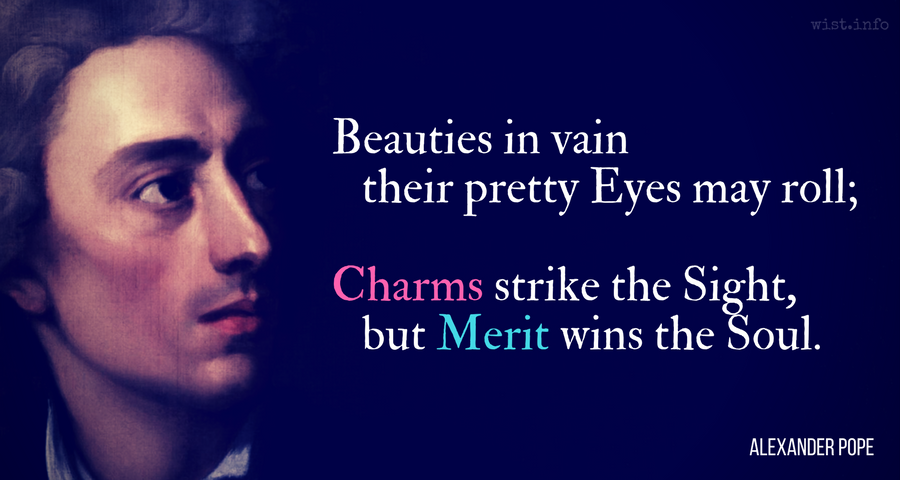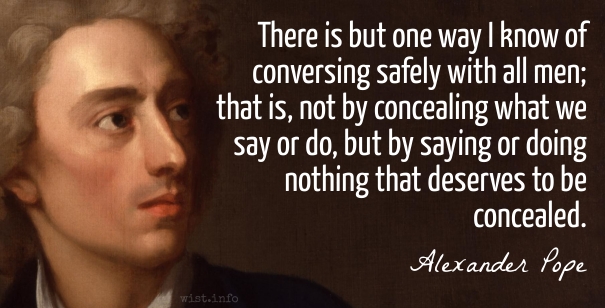What Nature wants, commodious Gold bestows,
‘Tis thus we eat the bread another sows:
But how unequal it bestows, observe,
‘Tis thus we riot, while who sow it, starve.
What Nature wants (a phrase I much distrust)
Extends to Luxury, extends to Lust;
And if we count among the Needs of life
Another’s Toil, why not another’s Wife?
Useful, we grant, it serves what life requires,
But dreadful too, the dark Assassin hires:
Trade it may help, Society extend;
But lures the Pyrate, and corrupts the Friend:
It raises Armies in a nation’s aid,
But bribes a Senate, and the Land’s betray’d.Alexander Pope (1688-1744) English poet
“An Epistle to Allen, Lord Bathurst: Of the Use of Riches” (1733), Moral Essays, Epistle 3 (1735)
(Source)
Quotations by:
Pope, Alexander
A little learning is a dangerous thing;
Drink deep, or taste not the Pierian Spring:
There shallow draughts intoxicate the brain,
And drinking largely sobers us again.Alexander Pope (1688-1744) English poet
“An Essay on Criticism,” Part 2, ll. 15-18 (1711)
(Source)
In Greek mythology, the Pierian Spring was sacred to the Muses, representing the metaphorical source of knowledge.
The first line is more commonly paraphrased as "A little knowledge is a dangerous thing."
Words are like Leaves; and where they most abound,
Much Fruit of Sense beneath is rarely found.
All nature is but art unknown to thee,
All chance, direction which thou canst not see;
All discord, harmony not understood;
All partial evil, universal good;
And, spite of pride, in erring reason’s spite,
One truth is clear, Whatever is, is right.
For forms of government let fools contest;
Whate’er is best administered is best:
For modes of faith let graceless zealots fight;
His can’t be wrong whose life is in the right.
In faith and hope the world will disagree,
But all mankind’s concern is charity.
Damn with faint praise, assent with civil leer,
And without sneering, teach the rest to sneer;
Willing to wound, and yet afraid to strike,
Just hint a fault, and hesitate dislike.
We may see the small value God has for riches by the people he gives them to.
Alexander Pope (1688-1744) English poet
“Thoughts on Various Subjects.” Miscellenies in Prose and Verse [pub. with Jonathan Swift], Vol. 2 (1727)
(Source)
May be quoting his friend, Dr. John Arbuthnot. The sentiment seems inspired by La Bruyere.
A man should never be ashamed to own he has been in the wrong, which is but saying, in other words, that he is wiser today than he was yesterday.
Alexander Pope (1688-1744) English poet
“Thoughts on Various Subjects” (1727)
This essay was published in Jonathan Swift, Miscellanies. It is sometimes incorrectly attributed to Swift, in his essay of the same name, published as ch. 16 in his The Battle of the Books And Other Short Pieces.
What Tully said of war may be applied to disputing: “It should be always so managed as to remember that the only true end of it is peace.” But generally true disputants are like true sportsmen, — their whole delight is in the pursuit; and the disputant no more cares for the truth than the sportsman for the hare.
For as blushing will sometimes make a whore pass for a virtuous woman, so modesty may make a fool seem a man of sense.
One who is too nice an observer of the business of others, like one who is too curious in observing the labor of bees, will often be stung for his curiosity.
Laugh at your Friends, and if your Friends are sore;
So much the better, you may laugh the more.Alexander Pope (1688-1744) English poet
Epilogue to the Satires, Dialogue 1, ll. 55-56 (1738)
(Source)
Yet, taught by time, my heart has learned to glow
For other’s good, and melt at other’s woe.
Beauties in vain their pretty Eyes may roll;
Charms strike the Sight, but Merit wins the Soul.
Blessed is he who expects nothing for he shall never be disappointed.
Alexander Pope (1688-1744) English poet
Letter to John Gay (16 Oct 1727)
(Source)
Pope referred to this, in the letter, as "The Ninth Beatitude." He may have used the phrase the previous year in a letter to William Fortescue (the letter is not given a date, but is grouped with a letter from John Gay to Fortescue of 23 Sep 1725). In both letters, Pope indicates he devised the saying many years previously.
Repeated by Benjamin Franklin, without citation, in Poor Richard's Almanack for May 1739.



